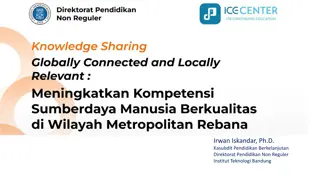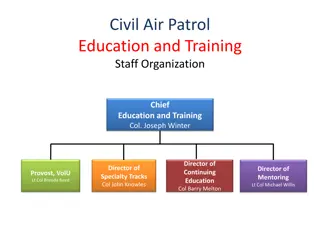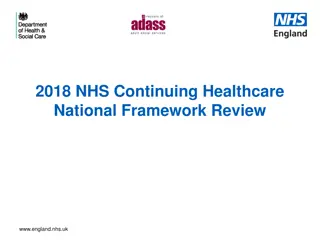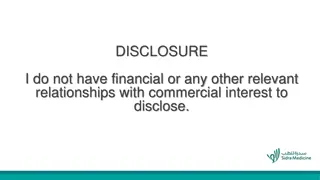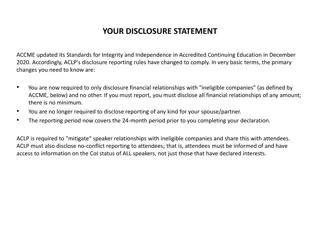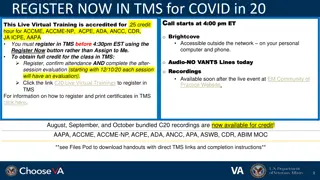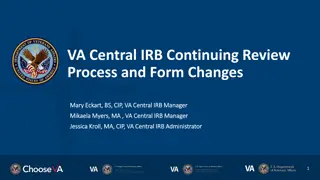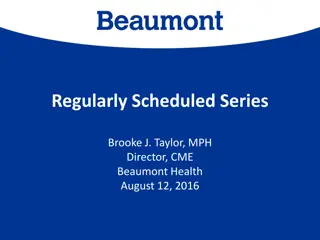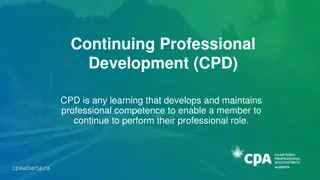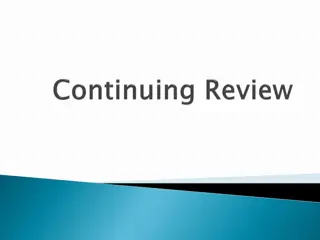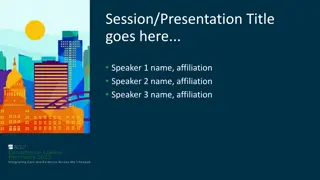
Exploring Continuing Education: Definition, Importance, and Implementation
Discover the world of continuing education, its definition, significance, and application. Learn about the benefits of professional continuing education and how licensing bodies enforce education requirements in various fields to promote knowledge expansion and professional development.
Download Presentation

Please find below an Image/Link to download the presentation.
The content on the website is provided AS IS for your information and personal use only. It may not be sold, licensed, or shared on other websites without obtaining consent from the author. If you encounter any issues during the download, it is possible that the publisher has removed the file from their server.
You are allowed to download the files provided on this website for personal or commercial use, subject to the condition that they are used lawfully. All files are the property of their respective owners.
The content on the website is provided AS IS for your information and personal use only. It may not be sold, licensed, or shared on other websites without obtaining consent from the author.
E N D
Presentation Transcript
StudyMafia.Org Continuing Education Submitted To: Submitted By: Studymafia.org Studymafia.org
Table Contents Definition Introduction About Continuing Education Importance of Continuing Education Implementation of Continuing Education Conclusion 2
Definition Continuing education is a broad term which refers to students pursuing their post- secondary or university-level education after some gap. 3
Introduction The term 'continuing education' is popularly used in the North American countries of Canada and the United States of America. Continuing education in Ireland and the United Kingdom refers to 'further education'. The learning of the course details predominantly happens at a remote place with minimal help from teachers. However, the students need to appear and pass an examination before which they would not be awarded the degree. 4
About Continuing Education Within the domain of continuing education, professional continuing education is a specific learning activity generally characterized by the issuance of a certificate or continuing education units (CEU) for the purpose of documenting attendance at a designated seminar or course of instruction. 6
About Continuing Education Licensing bodies in a number of fields (such as teaching and healthcare) impose continuing education requirements on members who hold licenses to continue practicing a particular profession. These requirements are intended to encourage professionals to expand their foundations of knowledge and stay up-to- date on new developments. 7
About Continuing Education Depending on the field, these requirements may be satisfied through college or university coursework, extension courses or conferences and seminars attendance. Although individual professions may have different standards, the most widely accepted standard, developed by the International Association for Continuing Education & Training, is that ten contact hours equals one Continuing Education Unit 8
About Continuing Education Not all professionals use the CEU convention. For example, the American Psychological Association accredits sponsors of continuing education and uses simply a CE approach. In contrast to the CEU, the CE credit is typically one CE credit for each hour of contact. 9
Importance of Continuing Education Increases your chances for promotion. Many times, employers find your pursuit of continuing education a great reason to give you a promotion. They recognize you ve invested time and sometimes money into improving yourself and want to reward that. Your new education also makes you more qualified for advanced work and an ideal candidate for promotions. 10
Importance of Continuing Education Increases your salary. Continuing education often leads to a raise or a higher starting salary at a new position. Whether you will be offered a raise or promotion in your current job or will qualify for a new job that has a better salary, continuing education will have a major benefit for your income. 11
Importance of Continuing Education Increases your ability to make a career transition. From nurses to teachers to accountants, many professions have strict requirements for licensure or degrees in order to qualify. Obtaining this education will make you prepared to move into a new career. 12
Importance of Continuing Education Improves your image and marketability. Continuing education is a valuable element to your r sum . For many jobs it is a direct qualification requirement to have a certain amount of education, but even if you meet the minimum qualifications, additional education will make you stand out. 13
Importance of Continuing Education Improves your lifestyle. If you re not satisfied with your current lifestyle, continuing education could be the answer to your problems. Want to make more money? Want to switch your job? Want to feel more fulfilled? Need new skills? Continuing education can help you accomplish all these goals. 14
Importance of Continuing Education Improves your lifestyle. If you re not satisfied with your current lifestyle, continuing education could be the answer to your problems. Want to make more money? Want to switch your job? Want to feel more fulfilled? Need new skills? Continuing education can help you accomplish all these goals. 15
Importance of Continuing Education Increases personal development. Even if you re completely satisfied with your job and lifestyle, that doesn t mean continuing education isn t for you. Whether you want to learn more about a subject that you find interesting or want some additional skills to take to your work, there are ways you can use continuing education to your advantage. 16
Implementation of Continuing Education Certain jobs need applicants to have a particular degree against their names for consideration, which forces students to go back to the classroom. But, not all would have the privilege to give up their employment for some time in order to gain knowledge through formal learning. Continuing education courses are specially designed for these people. 17
Implementation of Continuing Education With continuing education, students learn on their own with very little to no knowledge transfer happening from a teacher, but would take up an examination before being accorded with a degree. With the help of continuing education, there are so many individuals being awarded a graduate and postgraduate degrees on a yearly basis in India. 18
Implementation of Continuing Education Continuing education is popular amongst those who have taken up a job or running their own venture, and would like to have a degree against their name. This mode of education does not need students to attend classes as regular students do. General continuing education is comparable to adult education. Courses that come under continuing education are intended only at the adult population. 19
Conclusion Typically, the continuing education courses are offered by a department or a separate school for continuing education of a university or college. This has facilitated those that want to get back to learning in order to gain certain knowledge or skills. 20
References Google.com Wikipedia.org Studymafia.org Slidespanda.com
Thanks To StudyMafia.org


